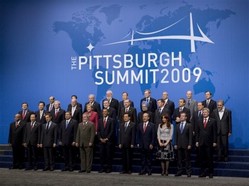In Support of a Global Transaction Tax

Last week, the G-20 formally agreed to become the new G-7, which theoretically will help put a little more "oomph" into policies designed to tackle the twin challenges of maintaining global economic growth while restructuring economies worldwide to fit low-carbon or even carbon-free economic growth models.
Piggybacking on the recent surge in international coordination, Germany's Minister of Finance Peer Steinbrück wrote recently on the case for a global financial-transaction tax:
A global financial-transaction tax (FTT), applied uniformly across the G-20 countries and covering all financial transactions at a very low rate, is the obvious instrument of choice to ensure that all financial-market participants contribute equally. Foreign Minister Steinmeier and I are suggesting that the G-20 take concrete steps toward implementing an FTT of 0.05% on all trades of financial products within their jurisdictions, regardless of whether these trades occur on an exchange. National governments could establish a personal allowance to exempt retail investors.Based on calculations by the Austrian Institute of Economic Research, which studied the possible effects of general FTTs on behalf of the Austrian government, a global FTT of 0.05% could yield up to $690 billion per year, or about 1.4% of world GDP. Such a tax would not unduly burden financial-market participants, yet it would raise a significant amount of money to finance the costs of this crisis.
This makes a lot of sense. A small tax like this would help build a "rainy day fund" in preparation for whenever the global economy next takes a slight downturn, a policy that has proven highly successful in countries like Chile and Norway. The slight tax might also nudge investors toward buying and holding, which might also help deter against a major run on the dollar and other currencies. Maybe such a tax could also help the U.S. avoid eventual economic meltdown as the rising costs of social welfare programs cause public debt to explode in the near future.
Steinbrück's suggestion is a good one, and the G-20 would do well to consider it.
(Photo Credit: AP Photos)



